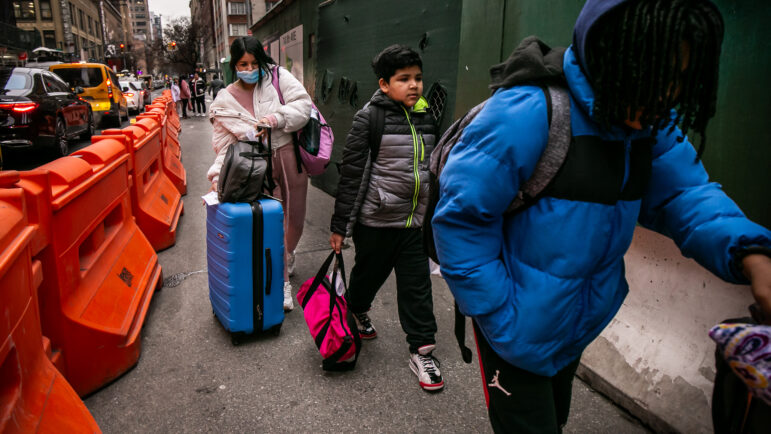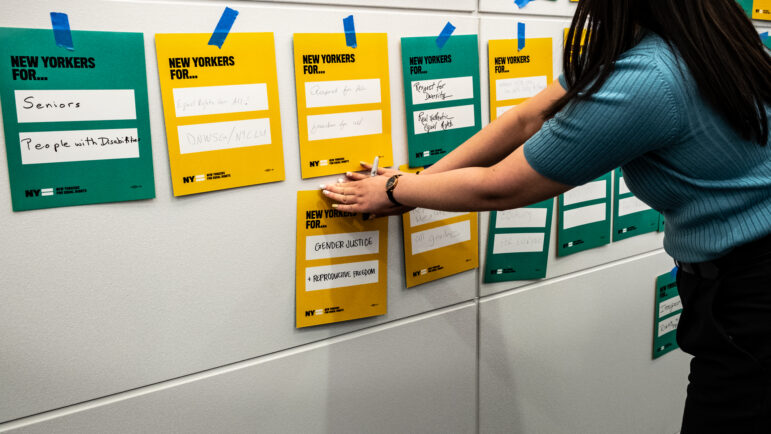Paralleling the flowers in City Hall Park, the navy blue and neon green t-shirts of DC 1707 members blossomed in rows outside City Hall over the past month, as daycare center workers protested the conditions – which they say ultimately harm the centers’ children – under which they find themselves working these days.
Employees of daycare centers reporting to the Administration for Children’s Services (ACS), represented by DC 1707 of AFSCME, are trying to catch the mayor’s attention and restore a $15 million budget cut that dissolved the afterschool programs run by the centers. They have been working without a contract since March 2006, when the contract for 8,000 employees at ACS centers expired.
The current protests are an expression of several years’ worth of complex, contentious changes to New York City’s publicly funded daycare system for preschool-age children and its afterschool programming for children in kindergarten through 12th grade. The contract dispute comes at a time when center employees have had their roles and reporting structure redefined. They have responded by periodically transforming from nurturing caretakers to sign-wielding demonstrators.
“It’s just like – they closed down the centers, now they’re trying to get rid of you,” said Yolanda Dumes, a 25-year daycare veteran with credits toward early childhood education certification who works at the Nuestros Ninos center in Williamsburg. She sees less experienced workers being hired for daycare jobs that used to require more credentialing.
The seed of DC 1707’s protests, which have been taking place on and off all month, apparently was planted in the fall of 2003 when Mayor Bloomberg launched an initiative to create a city-run afterschool program called Out of School Time (OST). The new program – currently the largest of its kind in the country, enrolling 74,000 participants from elementary-schoolers on up to teenagers – was designed to cut costs and expand enrollment. Although the city had previously funded afterschool programs run by four separate agencies, the new model would consolidate spending for afterschool services to a single agency: the Department for Youth and Community Development (DYCD). The decreased funding would give DYCD $2,800 to spend on each program participant per year, as opposed to the $4,600 per child available to its predecessors.
Of the 335 ACS day care centers in New York City, 139 ran afterschool programs that consequently had their funding cut, and 600 employees were laid off. When word came down that these programs would be discontinued, ACS center employees responded in “outrage, complete outrage,” said Andrea Anthony, executive director of Day Care Council of New York, which, as an umbrella organization for boards of nonprofit daycare centers, is the intermediary in the current contract negotiations between DC 1707 and the city. “Child care advocates rallied together saying, ‘You can’t do this, you’re going to hurt child care.'”
With $1,800 less per child to work with, the centers had to adapt their afterschool programs. High school and college students were hired, without benefits, as afterschool caretakers – one of the money-saving measures understood to be part of the new OST program. That ran counter to an Oct. 2005 collective bargaining agreement between ACS centers and the city that guaranteed all employees at the centers be unionized and receive benefits, according to DC 1707. The OST employees were non-union members performing union work, which meant the mayor was “union-busting,” DC 1707 says.
City Councilmember Letitia James of Brooklyn, who was noted at last week’s rally for her past efforts in stopping the closure of 20 ACS centers, said in an interview, “You’re talking about bringing on a number of unskilled workers and paying them at really low wages, and not providing the benefits that 1707 offers its members – and that’s where the tragedy is because these are individuals who will be caring for our children.”
According to DYCD press officer Ryan Dodge, OST is “a more efficient and better-coordinated system of [afterschool] programs for the city’s school-age population. [The mayor] initiated this system overhaul with the goal of consolidating and streamlining services and increasing accountability measures.”
To improve accountability, the OST program includes a web-based enrollment and attendance tracking system and will be evaluated annually by the Policy Studies Associates, an education and early development research group.
DYCD also has committed $2.6 million to partner with nonprofit cultural organizations to promote artistic activities during OST hours. Dodge wrote in an e-mail that OST programs often are able to take advantage of public outdoor spaces, because “many OST programs are located in New York City Housing Authority facilities, Department of Parks community centers, and Department of Education schools which results in reduced costs.”
Still, DC 1707 representatives maintain that the OST programs fall short in providing qualified instruction and supervision to program participants.
Mark Levine, who analyzes childrens’ programs in his role as executive director of the Center for After-School Excellence, an initiative of The After-School Corporation, says the meaning of afterschool time has changed from mostly recreational and “keeping kids off the streets” to an important period for study and enrichment, particularly as music, art and sports lose their time slots in the school day. Thus afterschool program employees deserve pay, respect and professional status more like that of teachers, Levine said: “This is the context in which I think the labor unions are rightly voicing concerns.”
Because an infusion of local, state and federal money is spurring rapid growth in the afterschool sector, however, he sees opportunities around the bend. “I think there may be some cause for optimism longer-term here. … Hopefully there will be more funding for training in general and specifically even for college training,” he said.
ACS centers employ college-educated, licensed teachers who develop structured curriculums in science, math, reading and writing. Staff cooks prepare meals and snacks. Car pooling and other transportation options are available to participants. “They [are] set up in such a way logistically where they stabilize neighborhoods,” said Neal Tepel, a DC 1707 aide.
After the dissolution of their afterschool programs, ACS centers were able to apply to DYCD to host the Out of School Time programs. Anthony said that in sessions between Day Care Council and ACS, “we did encourage them to apply, thinking that they would be able to keep some semblance of their program.” But only 28 were granted contracts to host OST programs.
Then in September of 2005, as the expiration date on its contract neared, the union opened negotiations with ACS. The union made its $15 million reinvestment demand a major condition of contract renewal. But the city maintained the OST program was an entity distinct from the ACS center afterschool programs, and refused to increase ACS funding for the coming fiscal year. Negotiations continually stalled, and in February of 2006, DC 1707 sought arbitration.
The arbitrator decided: “Employers are required to provide the economic benefits set forth in the agreement, and if the City wants these after-school programs to be successful, which is assumed to be the case, the City must provide the Employers with funds to enable them to operate these programs in accordance with the economic terms of the Agreement.”
Yet the arbitration has had little affect on negotiations, and DC 1707 still does not have a contract. On May 7, Anthony of the Day Care Council again discussed the union’s terms with Office of Labor Relations Commissioner James Hanley. He said “he would get back to us in two weeks. So technically the two weeks were up on May 21st,” she said. While Anthony spoke positively of Hanley as generally responsive, “I haven’t heard from him,” she said. “And I don’t know why.”
Meanwhile, the mayor’s office refers inquiries on the matter to DYCD. And Dodge at DYCD says his agency “is not a party to the collective bargaining agreement between DC 1707 and the Day Care Council.”
But the Day Care Council is waiting for a response from the mayor’s office. Last Tuesday’s rally of DC 1707 members didn’t bring one. Asked what the timeline for this contract negotiation might be, Councilmember James, who is exploring ways to include the contested $15 million as a council budget initiative, said, “I don’t have an answer, that’s a question for the mayor and his people.”
This story has been updated. 5/30/07








